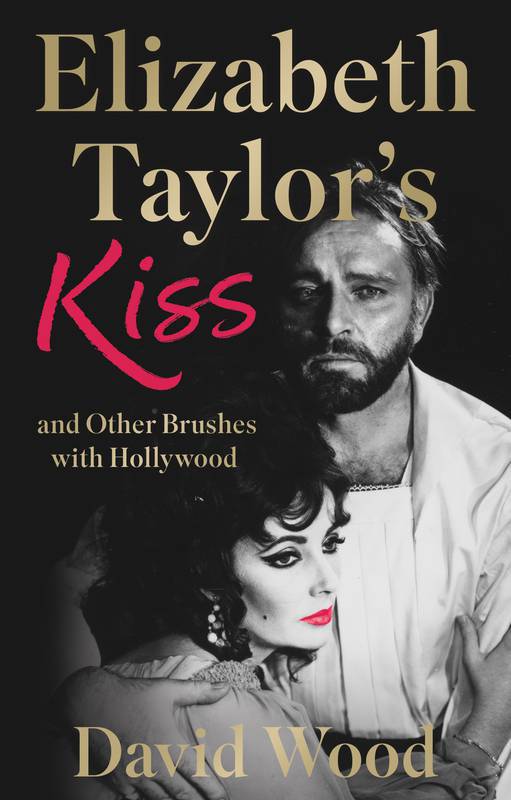News
8 August 2022 / Books
David Wood’s new book reviewed

David Wood, the notable playwright and producer (and member of the Society) has just published his new memoir. Here is a review by Don Chapman, for many years the theatre critic of the Oxford Mail, and himself the author of the STR’s Annual Publication for 2008 Oxford Playhouse: High and Low Drama in a University City
No late buses then. Walking down Headington Hill after reviewing the first production at the college of technology later to become Oxford Brookes University I fell in step with a flaxen-haired student in his first year at Worcester College, David Wood.
I was amazed. Most theatre-minded Oxford University undergraduates lived in their own little world. To Frank Hauser’s fury they didn’t support his ground-breaking productions at Oxford Playhouse. They only went to the New Theatre when some luminary like Olivier visited.
David was different. As his latest book, Elizabeth Taylor’s Kiss and Other Brushes with Hollywood (The Book Guild, £9.99), makes clear by the time he graduated he had made friends with a host of actors and theatre people amateur and professional.
He had established an enviable student reputation as actor, writer, lyricist, revue artist, composer, and director. As Oxford Mail theatre critic, I particularly remember him dancing across the stage hair flying in Braham Murray’s anti-capital punishment entertainment, Hang Down Your Head and Die.
He had also become an ardent collector of personal theatrical memorabilia. One of the joys of his book is the illustrations that interleave its pages. Another is the authenticity they lend to some of the more eyebrow-raising set-pieces.
The title, like the cover, is something of a tease. ‘The next day was my 22nd birthday,’ he writes. ‘As midnight struck Elizabeth Taylor wished me many happy returns and kissed me on the lips… It wasn’t a sensual kiss, rather a warm and sincere acknowledgement of [a] friendly and warm relationship.’
The occasion that prompted it has become a legend and is still the production that people most often ask me about: the visit to Oxford of Richard Burton and Elizabeth Taylor to play Dr Faustus and Helen of Troy in Professor Nevill Coghill’s revival of Marlowe’s tragedy for the University Dramatic Society.
David’s account casts a fascinating insight into the run-up to the first night and the cordial relationship that developed between stars and student actors. Being involved in the play, of course, he and they never got to see the moment that brought the world’s press to Oxford.
As I said at the time: ‘Never before in the history of the play’s performance can the actress playing Helen of Troy have approached the part with a beauty and reputation to match, and never before can a director have made such strikingly poetical use of her.’
The trouble was the production didn’t begin until 8pm, a starting time dictated by college eating habits. Nobody had thought to brief the press that Elizabeth didn’t appear until late in the evening nor that she would not open her mouth. The result was an increasingly restive posse of critics as their deadlines loomed and a sheaf of undeservedly fractious notices.
Compared to the West End production of the musical, Jeeves, ln which David played Bingo Little, it was a minor hiccup. With music by Andrew Lloyd Webber and book by Alan Ayckbourn what could possibly go wrong? Thanks to a director who didn’t know what he was doing and a trio of producers who didn’t show an interest in their investment until far too late, everything that could go wrong did.
David’s blow-by-blow account is a textbook illustration of a theatrical flop in the making and the chapter many readers will find most engrossing. But for sheer entertainment value it has to be his encounter with the Hollywood legend, Shelley Winters, in John Kane’s two-hander play for television, The Vamp.
It is the tale of the would-be seduction of a young admirer by an aging star upon whom it gradually dawns she is past it. Drawing on the sound engineers’ illicit recording of Shelley’s ‘off-camera remarks and tirades’, David is able to produce a laugh-out-loud account of a queen of the cinema at her most temperamental yet still turning in a great, if somewhat costly, performance.
His book could have done with a stricter copy editor to iron out the odd occasion when his mentions of the famous are so brief as inadvertently to amount to name-dropping and he surely should have extended his 133 pages to say more about his children’s plays.
A West End Christmas run of The Plotters of Cabbage Patch Corner caught the eye of Disney’s representative in London and would eventually lead to him working for the film mogul. He writes: ‘I suppose it was a “green” play written some years before green issues rightly became fashionable.’
In fact, he was the first playwright to explore the issue and he would go on to alert tomorrow’s audiences to other issues like pollution and climate change that now loom large in the global consciousness. I suspect they will prove his true legacy.
Don Chapman August 2022
David’s book can be found in paperback and e-book versions here